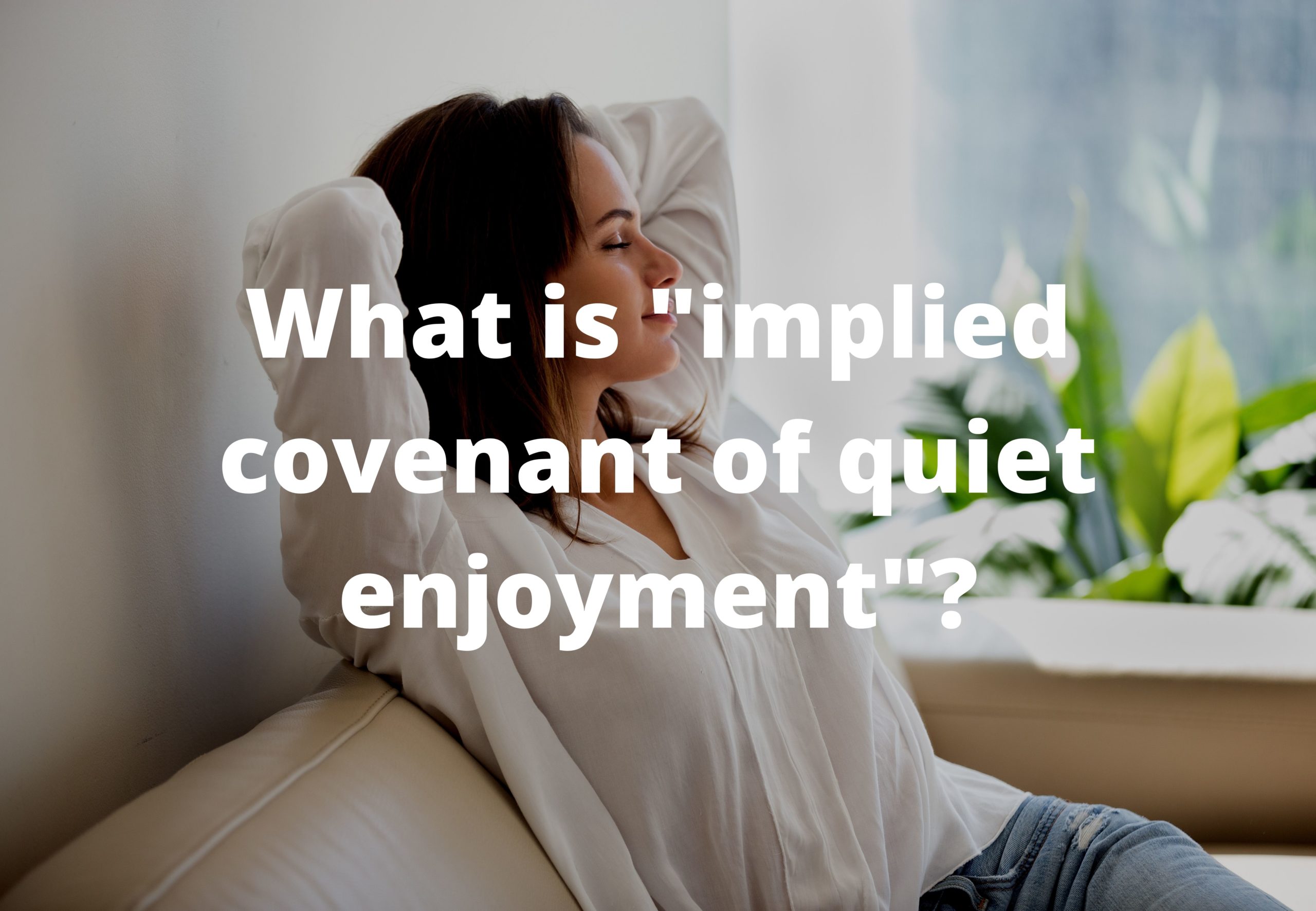
When discussing tenant rights and privacy, you might come across the term ‘quiet enjoyment.’ This is a basic right that every tenant possesses. What exactly does this mean? All of us have differences when it comes to levels of quiet enjoyment. Sometimes, what one person may perceive as an acceptable degree of silence is different for another.
This article will focus on defining the “implied covenant of quiet enjoyment.” We’ll also be talking about how it can be violated and the available course of action for tenants to take. As a landlord, it’s recommended to learn about this basic right, so that you abide by the law. It will also help you retain your tenants for the long-term.
Definition of Implied Covenant
When something is an “implied covenant,” it means that a landlord does not have to state a given right in a lease for it to be followed. Certain rights are accorded to tenants, and these are understood. It’s not even something that can be contested or given up. By being an “implied covenant,” it does not need to be specified in a verbal or written form.
Definition of Quiet Enjoyment
Tenants have automatic rights, and at the head of these is the right to quiet enjoyment. Another one is being provided a habitable rental space. When we say a right to “quiet enjoyment,” this means a landlord must grant a harmonious and peaceful living environment.

Tenants have a right to enjoy living in a rental unit free of disturbances. The landlord must do everything in his power to keep the living arrangement tranquil and conflict-free.
Landlord Liability
When landlords ignore the tenant’s right to be free from any interference, they are liable. Some states even allow tenants to get a full or partial refund from the landlord. This happens when landlords are not able to fix a disturbing situation reported by a tenant.
However, the tenant must offer substantial evidence of the interference. It must be qualified and not categorized as simple, trifling annoyances only.
Take, for instance, a neighbor who has been holding noisy late-night parties. This scenario isn’t categorized as a disturbance that a landlord can control. Thus, a tenant can’t hold a landlord liable in this case. If another tenant next-door caused the noise, then the landlord has a liability to remedy the situation. Peace must be restored for other tenants to enjoy settling into their rental space. Otherwise, the landlord is subjected to breaching the implied covenant of quiet enjoyment.
Tenant Rights
Tenants enjoy several rights, such as:
- Privacy
- Peace & Quiet
- Safety & Security
- Access to Basic Utilities
Definitions of Noise, Disturbance and Nuisance
Anything that hampers the quiet enjoyment of a tenant can be classified as a nuisance.

However, since levels of noise can be subjective, a blanket definition of noise does not exist. What one may deem as noise may not be defined as noise to another.
Violation of a Tenant’s Quiet Enjoyment
If a landlord continually breaches the covenant of quiet enjoyment, the tenant can refuse to pay the rent or end the tenancy. Part of the given conditions when a tenant decides to rent in a property is the quiet enjoyment and access to a safe and habitable rental space.
Here are some examples of common violations by the landlord that affect the tenant’s quiet enjoyment:
- Frequent entry into the rental unit without prior notice.
- Failure to stop noise, disruptions and forms of unreasonable nuisances.
- Snooping through a renter’s possessions.
- Harassment of a renter, whether face-to-face or over the phone.
- Restriction of a renter’s basic utilities (water, electricity).
Tenant Recourse
If a tenant finds that the landlord continually breaches the implied covenant of quiet enjoyment, they can do the following:
- Write to the landlord to request that the interference be stopped.
- Seek police help.
- Ask for money damages through a partial or full rent refund.
- Move out and ask for money damages.
- If a landlord attempts to evict the tenant, then the breach of quiet enjoyment is a good defense.
Difference Between Violations vs. Simple Annoyances
It helps to be aware when a situation is labeled as a violation of a tenant’s quiet enjoyment or merely a simple annoyance. Below are some examples to differentiate the two.
Violations of Quiet Enjoyment
- Late-night parties, loudly and frequently occurring on the premises.
- Other renters using the designated parking spot of a tenant.
- Tenant subjected to harassment by the landlord through threats and frequent drive-by inspections.
- Incessant barking by dogs belonging to other tenants.

- Major renovations that affect a tenant’s quiet enjoyment due to long-term construction noise.
Simple Annoyances
- Parties that end late, at around 11pm.
- The lack of parking spaces for all renters.
- A landlord frequently asking a tenant for the overdue rent.
- Occasional dog bark by another tenant’s pet.
- A few days of disruptive repair work that’s understandable (such as utility system reparation).
Bottom Line
Quiet enjoyment is something we all need, whether we’re landlords, tenants or homeowners. After the chaos of dealing with the outside world, it feels good to go home and relax. It’s understandable then for everyone to require relative peace and quiet at home.
A landlord who understands and practices empathy when it comes to tenants’ basic needs will have an easy time keeping them loyal to the property. Granting everyone a peaceful and harmonious dwelling in your property is one of the factors that affect a tenant’s decision in renewing a lease. It’s imperative that a landlord knows their obligation when it comes to the implied covenant of quiet enjoyment.
If you need a professional property manager in Central Florida, please contact TrustHome Properties at (407) 204 0360. We are actively managing properties in Orlando, Lake Nona, Davenport, Oviedo, Kissimmee, Winter Park, and surrounding areas.
